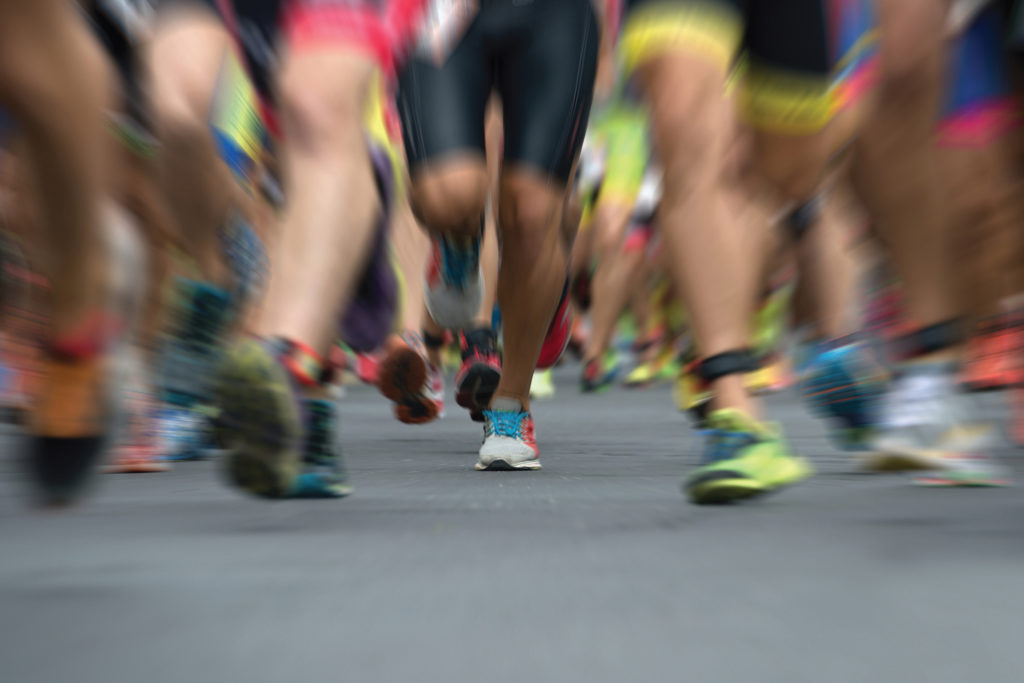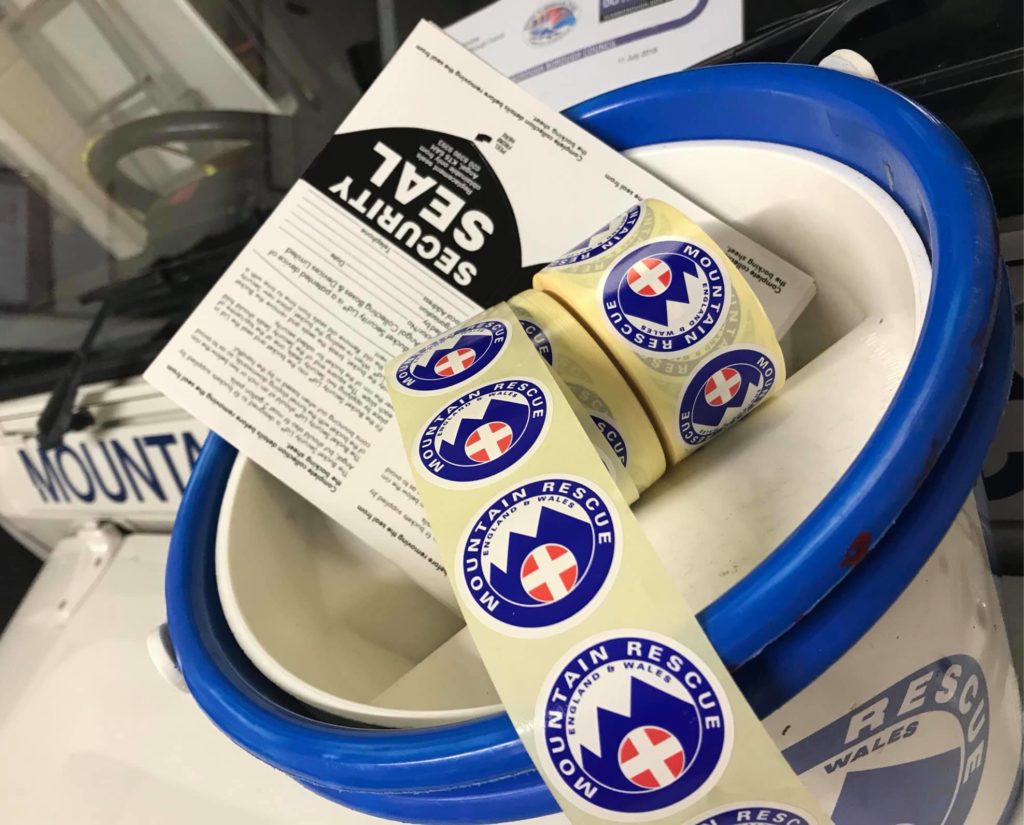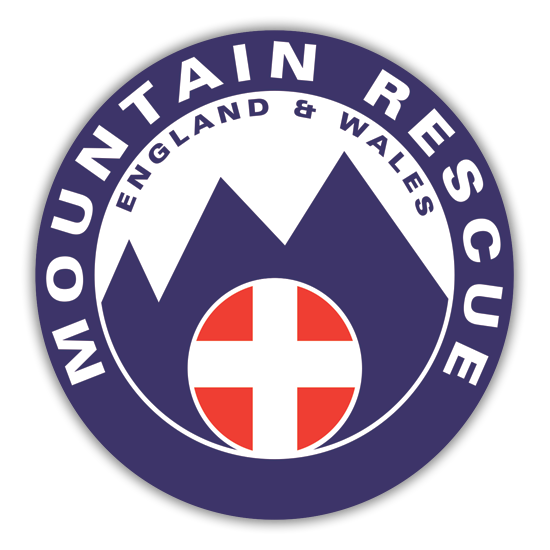Fact File 4: Fundraise for us
How to organise and run your own fundraising event for Mountain Rescue England and Wales
Q: I want to raise funds for you but what can I do?
There are a number of ways you can raise funds for us and many established events you could take part in (such as the London Marathon). Or you could organise your own – and help raise awareness of our work at the same time.

Q: How do I organise my own event?
• Whatever your particular challenge, be it baking a few cupcakes or testing your mettle at something more sporty, make sure you choose an event you will enjoy!
• Think about the people you will be approaching for donations. Who are they? How many? How are you going to communicate with them?
• Can you run this event on your own, or will you need help? How much will it cost to run? A general guide is to make at least three times as much as the event costs. Will you get extra revenue through Gift Aid or Employee Matching?
• Pick your date carefully. Does it clash with another event? Does the weekend make it easier for everyone to attend, or does it need to be held during work or school hours? Will you be able to organise everything in time?
• Find a venue. Is it suitable in terms of space, furniture, toilet facilities, disabled access? Book well in advance and make sure the venue staff know exactly what your event is. Ask what they can provide – equipment, publicity, catering facilities.
We cannot accept responsibility for accidents, so make sure your event is safe for all concerned. Assess the risks involved and make sure they are eliminated or minimised to acceptable levels, particularly in the case of children.
• Equipment. Work out what you need – TV, video, CD player, microphone – where you can get it from and any costs.
• Make sure the sums add up! Income might include ticket money, sponsorship, donations, raffles, auctions. Outgoings might include sale of goods, postage, promotional activity, food and drink. Local businesses may donate prizes, loan equipment or premises. Have somewhere safe to keep the money you collect, and arrange for someone to witness you count it.
Q: How do I register my intention to raise funds?
Our fundraising pack details how to register your event and send us the money you raise – available from fundraising@mountain.rescue.org.uk.

Q: What about publicity?
• Make sure people know about your event through local press, radio and TV, promotional material and social media.
• Mountain Rescue magazine. Don’t forget we have our own magazine! We’re always happy to publish funny, unusual or particularly inspiring stories in our magazine so the membership can see how you’ve supported us. To find out more, contact the editor via editor@mountain.rescue.org.uk.
• The ‘thank yous’. When it’s all over bar the shouting, make sure you thank everyone who supported you – it might even be an opportunity for a final burst of PR and fundraising.
Q: How do I pay the funds I’ve raised to you?
• You must give us all the money you raise within three months of any activity.
• The Charity Commission recommends at least two people to handle and record any money received, and that all the cash collected is banked by your charity as soon as possible.
• Make cheques payable to ‘Mountain Rescue England and Wales’ and sent to: The Office, Mountain Rescue England and Wales, PO Box 17664, Tamworth B77 9QB.
Q: Are there any legal requirements for running a fundraising event?
Yes. Charity fundraising is regulated by law and you, as a fundraiser – and your chosen charity – can be fined for non-compliance with legal regulations. There are a number of things you must do to comply with the law.
• Tell us about it. Return the event registration form and signed agreement to us as directed in the fundraising pack.
• Bingo. A ‘Bingo Night’ in aid of mountain rescue would be exempt from the licensing requirements which usually apply to bingo games. However, the stakes and fee must be no more than £3 and the total value of prizes must not exceed £300.
• Alcohol. You will need a licence to have alcohol at your event, except when it is not being sold and no indirect charge is being made for it (you cannot increase the ticket price to cover the cost). You can apply for a temporary licence (occasional permission) from your local magistrate’s court, giving a minimum of a month’s notice. Alternatively, hold your event on licensed premises or asking a local pub to organise a bar at your venue.
• Food. You must be aware of food safety laws and follow food hygiene procedures. Contact your local authority environmental health department for further information.
• Charity name and number. The words ‘Mountain Rescue England and Wales’, and the charity registration number ‘1178090’, must appear on all promotional literature. Use of the official MREW logo must have prior approval – please contact us for guidelines on how to use the logo.
• Insurance. If you organise an event that involves the public in any way, you must ensure you have public liability insurance. Check if your company policy covers you for such activities. Check insurance requirements (particularly for dangerous sports events).
Q: What’s the difference between a lottery, a raffle and a competition?
• A lottery is a game of chance in which tickets are sold, enabling the holder to qualify for a prize or money.
• A raffle is just another word for lottery and raffles are subject to strict guidelines, depending on the type and size.
• Where there is an element of skill involved, it becomes a competition and has fewer restrictions.
Q: How do I run a raffle?
A raffle is a fantastic way of raising funds for us. Here’s a few things you need to think about.
• Get a licence. If you run a raffle as part of a wider fundraising event, you don’t need a licence. But, if your raffle is a stand-alone fundraiser, you will need one a licence and must apply to your local authority licensing office. A small ‘society lottery licence’ costs £40 for the first year and £20 for each year after – allowing you to run multiple raffles in that year up to £250,000 in proceeds. Each draw can have a top prize of £25,000 and maximum proceeds of £20,000 in ticket revenue.
This licence can also be used to run a lottery where players join a weekly or monthly draw and the prizes can roll over or have prizes up to a maximum of £25,000.
• Gather your prizes! Approach local businesses and contacts to donate prizes (the most cost effective way of doing things) – making sure that whatever they donate appeals to your intended ticket buyers!
• Organise your tickets. You could use printed tickets or online tickets. There is a required legal format for tickets. You must include:
• The name of the organisation running the draw
• Date and place of draw
• The name and address of the promoter (a named individual with a full postal address (not necessarily a private address)
• Price of ticket. The price of each ticket must be the same. It is ILLEGAL to offer free tickets (eg. Tickets: 25p each, 5 for £1)
• The charity number.
• Plan your draw – either the traditional bucket or an online draw using a licensed random number generator.
• Make sure you keep it legal. The legal requirement for your raffle licence is that 20% of the total proceeds must be directly used to fund the charity. Once you have completed your raffle a submission must be made to the local authority within three months of the draw. They’ll send you a template return which will ask for more information including:
• details of the draw including when tickets were sold, the dates of any draw(s) and the arrangements for prizes (including any rollover)
• the proceeds of the draw(s)
• the amounts deducted in respect of the provision of prizes
• the amounts deducted in respect of other costs incurred in organising the draw
• any amount applied to a purpose for which the promoting society is conducted
• expenses that were paid for other than by deduction from the proceed.
Q: Where will my money go?
Running a mountain rescue team is an expensive business. Each team must find the funds to maintain their team base, run and maintain their vehicles, buy and replace waterproof clothing and medical equipment.
The funds we raise nationally can go a long way towards supporting the teams by providing or subsidising some of the larger items of equipment such as stretchers, casualty bags and vacuum mattresses, or key items of clothing. We can also help towards the cost of insurance for team members and vehicles and provide subsidised, nationally-run training courses. So the more we are able to raise centrally, the more we can help take the pressure off teams.
To give you an idea how much it costs to kit out a rescue team and its members, consider the following:
- Full rescue harness: £125
- Rope: £80
- One set of rescue hardware: £700
- Comprehensive First Aid Kit: £300
- One set of PPE: £500
- Stretcher: £3,500
- Entonox cylinder: £18
- Team vehicle: £40,000+.
And most teams now have a minimum of two vehicles, some four or five, two or three stretchers and medical sacks – so you can see how it mounts up.
Q: How much does it cost to kit out a team member?
Most team members wear and carry a combination of essentials supplied by their team, supplemented by their own gear. Bear in mind that each time a team member sets foot on an incident, they must be prepared to be out for many hours, often in dreadful conditions. So, let’s start from the outside and work inwards. Personal choice means we sport a variety of boots and accessories on the hill so we’ve chosen the sort of gear the average team member might turn out in.
Outer layer: Waterproof Jacket £500 + Windproof Smock £75 + Waterproof Trousers £300 = £875.
Next layer: Mountain Pull On £125+ at least one item of spare clothing £60 = £185.
Base layer: Long Johns £50 + T shirt £25 + Briefs £15 (plus, let’s say, Sports Bra for the ladies £25) = £115.
Footwear: Three Season Walking Boot £175 + All Terrain Walking Socks £25 + Gaiters £30 = £230.
Headgear: Beanie Hat £25 + Neck Warmer £25 + Head Torch £100 + Helmet £60 = £210.
Hands: Technical Gloves £85 + Inners £35 + Hand Torch £60 = £180.
Accessories: 40L Rucksack: £80 + OS Maps £40 + A-Z Maps £40 + Compass £50 + Personal First Aid Kit £45 + Notepad and Pen £10 + Two Man Bothy Shelter £30 = £295.
Comms Equipment: Radio £750+
Grand Total: (and counting) £2840*
*Prices quoted are approximate.
Ten Top tips for successful fundraising
- Brush up on a few facts about mountain rescue!
- Find out what the money might fund – and tell people about it.
- Start as soon as possible and carry your sponsorship form on you at all times!
- Use our sponsorship form and share copies with your family and friends.
- Get friends and family on the form first – let them set the bar!
- Ensure your contact details are clearly marked on the form.
- Ask people to give the money up front to save time later chasing up what’s owed.
- Gift Aid. Encourage sponsors to tick the Gift Aid box and include their full name and home address so we can claim Gift Aid – an extra 25p of every pound.
- PR, PR and more PR. Promote your event as much as possible through as many means as possible: radio and TV, newspapers and social media.
- Matched Giving. If your employer is a member of a matched giving scheme, ask them to match the amount you have raised.
Related pages
Share This Page
Keep in touch
If you'd like to keep in touch, why not subscribe to our mailing list?
By signing up, you accept the terms of Mountain Rescue England and Wale’s Privacy Policy and consent to receive our emails with access to our latest news and events. You can unsubscribe at any time.
